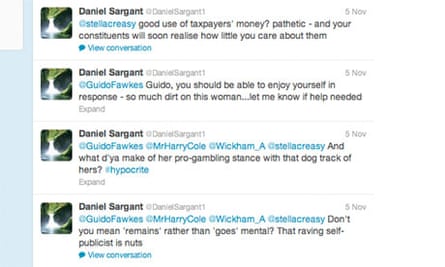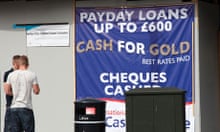The MP and anti-payday loans campaigner Stella Creasy has demanded an apology from the online lender Wonga after a Guardian investigation uncovered evidence that an employee of the firm has been using an anonymous Twitter account to publicly attack her, calling her mentally unstable.
Wonga's slogan and adverts promise "straight talking money", but company computers appear to have been used to post anonymous comments on blogs critical of its practices and there is evidence that a second Wonga employee has deleted criticism from its Wikipedia page.
A computer in the Wonga offices appears to have been used to remove from the company's Wikipedia page a reference to controversy over its sponsorship of Newcastle United Football Club and to delete the category of "usury" under the See Also section.
Wonga admitted on Tuesday a "junior employee" might have made unauthorised comments online and would face disciplinary action if found to have been responsible for the abusive tweets. It defended its right to correct "inaccurate" entries on Wikipedia.
Wonga has faced mounting criticism for targeting low-income customers with short-terms loans charging an annualised interest rate of 4,214%, but the evidence seen by the Guardian suggests at least one employee has been fighting back by using so-called "sock puppet" accounts to attack critics and post favourable comments underneath articles about the firm.

One Twitter account, traced to someone operating within Wonga's London office, called Creasy "mental", "nuts", and a "self-serving egomaniac" because of her campaigning against the controversial firm and the wider payday loans market.
Creasy said: "Wonga have been less than positive about the arguments I've made about cost-capping [of short-term loans] and have been the most virulent and aggressive about defending the industry as a whole. They will obviously stoop to many levels and this is just one of them. I would expect an apology."
The Twitter account was operated in the name of @DanielSargant1, but it was closed shortly after the Guardian questioned Wonga about its provenance.
Someone using the same unusual spelling of this name also left a comment defending Wonga – calling the firm "a rare British tech success story" – on an article critical of Wonga on a blog called the Silicon Roundabout Reboot. His comment came from the same internet protocol (IP) address as that used by Luke Manning, editor of OpenWonga (a Wonga-owned website that aims to educate consumers about the brand), when he also made a comment on the blog.
An IP address is a unique set of numbers, much like a telephone number, that computers use to communicate with one another. Computers that share a router to connect to the internet will appear to have the same IP address. Manning confirmed that he had left the comment attributed to OpenWonga using Wonga's computer system, but said he did not know who had left the comment attributed to Daniel Sargant.
A Wonga employee has used the same IP address to edit its Wikipedia page over the last three months, the latest amendment being made at the end of October.
"Conflict of interest editing" is a controversial practice that is "very strongly discouraged" by Wikipedia. The website allows anyone to edit its content, but the site maintains a neutral point of view policy. Its rules say adding material that appears to advance the interests or promote the visibility of an article's author, the author's family, employer, clients, associates or business, places the author in a conflict of interest.
A Wonga spokesman said: "We can confirm one of our junior employees may have made unauthorised comments on a blog, and elsewhere on the web, while not identifying themselves correctly. This is an issue that Wonga takes extremely seriously, as we are committed to openness and transparency. We are now carrying out a full investigation and, if the employee is found to be responsible, they will face serious disciplinary action."
Insiders claim Manning is not the employee Wonga suspects as the source of the Twitter abuse and that he only made minor changes to the Wikipedia entry. Someone using the Wonga.com IP address began editing the Wiki page in August, when it removed substantial portions from the criticism section. A note justifying one edit stated: "Added other side of the debate in question, for balance."
The latest edit carried out on 29 October 2012 removed reference to a blog entry on the Harvard Business Review website that described Wonga as "the worst business model in the world". Someone using the Wonga IP address also changed the name of the product from "Payday loan and short-term high-interest credit" to "Short-term credit".
However, Wonga is not alone in trying to improve its image on Wikipedia: the Central Intelligence Agency, the Vatican and Sony have all been exposed on Wikipedia for editing their own pages or employing others such as public relations agencies to carry out edits on their behalf.
The Wonga spokesman said: "Like many organisations, Wonga regularly reviews its Wikipedia entry to ensure it is both accurate and comprehensive. In doing so we adhere to a strict policy. We will add material that is both factually correct and we believe of interest to readers, plus we will occasionally seek to remove inaccurate material. We would not attempt to remove accurate material, even if negative, in keeping with the guiding principles of Wikipedia."
The Wonga spokesman said: "We are still carrying out our investigation, which will look all concerns raised but, to be clear, we do not condone any form of misleading or aggressive behaviour, on or offline."
The Wonga revelations come on the same day that the regulator, the Office of Fair Trading, wrote to all 240 payday lenders highlighting "emerging concerns" over poor practices in the market, including "aggressive" debt collection practices.








Comments (…)
Sign in or create your Guardian account to join the discussion